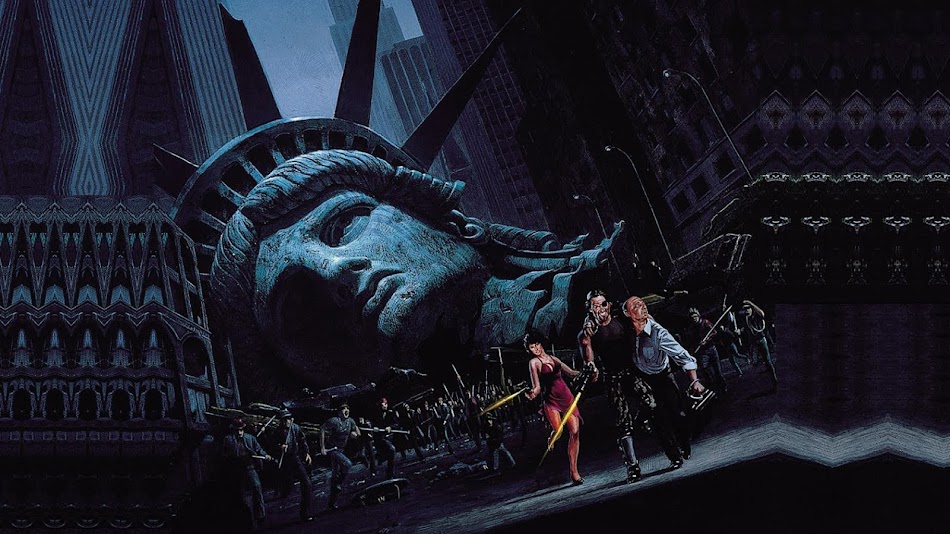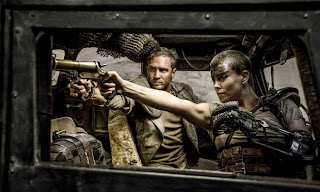SURVIVOR
(US/Italy/UK - 2015)
Directed by James McTeigue. Written by Philip Shelby. Cast: Milla Jovovich, Pierce Brosnan, Dylan McDermott, Angela Bassett, Robert Forster, James D'Arcy, Roger Rees, Benno Furmann, Frances de la Tour, Genevieve O'Reilly, Sonya Cassidy, Alex Beckett. (PG-13, 96 mins)
Ten years ago, SURVIVOR would've opened nationwide--probably in January, April, or early September--and likely been the #1 movie in America, at least for a week. Now, it's in "select theaters" (meaning, maybe ten) and on VOD, with US distributor Alchemy not even bothering to prepare a domestic trailer. Even with the relatively low budget of $20 million, SURVIVOR should look better than it does (obviously, the money went to the cast and little else). It's a brainless but fast-moving B-movie that Cannon cover band Millennium/NuImage didn't feel had the potential to be their next OLYMPUS HAS FALLEN, despite corralling three of its cast members--Dylan McDermott, Angela Bassett, and Robert Forster--in supporting roles, which also begs the question "How is Morgan Freeman not in this?" Set mostly in London but primarily filmed in Bulgaria, SURVIVOR stars Milla Jovovich as Kate Abbott, a top-level security expert at the US Embassy (this is the kind of film that feels the need to accompany a shot of the Thames and the London Eye ferris wheel with the caption "London"). Driven in her job and haunted by memories of being in one of the WTC towers on 9/11, Kate has an almost Spidey Sense when it comes to terror threats and something seems off with Dr. Emil Balan (Roger Rees), who's trying to get a visa to visit the US to attend a pediatrics convention. Balan is really in the employ of wealthy and generically Eastern European terrorist Zafer Pavlou (Benno Furmann), who has a half-assed plot to launch an attack in Times Square on New Year's Eve in order to manipulate the global economy in his favor. Pavlou's found the perfect patsy in Balan, a grieving, vengeful man who blames the death of his ill wife on US customs' hemming and hawing about allowing her a visa to travel to the US for treatment. When Kate's persistent questioning of Balan threatens to derail the operation, Pavlou dispatches The Watchmaker (Pierce Brosnan), one of the world's deadliest and most elusive assassins ("He's had so much reconstructive surgery, nobody knows what he looks like anymore!" says one US Embassy official) to take her out.
The Watchmaker is introduced completing a complicated repair on an expensive watch to show how methodical and precise he is, but of course, he repeatedly fails at killing Kate or there wouldn't be a movie. His initial actions--which include pointlessly blowing up an entire city block where Kate and some co-workers are having dinner, when all he really had to do was sneak up on her and put a bullet in her head--end up inadvertently making Kate the prime suspect in the eyes of the US Ambassador (Bassett) and the angry M.I.5 official on the case (James D'Arcy), but her boss and vague love interest Sam Parker (McDermott) is the only person who believes that she's being set up. Directed by Wachowski protege James McTeigue (V FOR VENDETTA, NINJA ASSASSIN), SURVIVOR is a watchable if unspectacular actioner that seems ready-made for Netflix Instant. It wants to have that sort-of globetrotting BOURNE momentum to its cat-and-mouse, race-against-time plot, but it doesn't have the cash flow to pull it off. Or, perhaps more accurately, it doesn't have the cash flowing to the right departments. Working with a significantly lower budget than he did in his days on the Wachowski payroll, McTeigue can't do much when he's saddled with the likes of the Bulgarian clown crew at Worldwide FX, whose cartoonish CGI histrionics here continue to make one appreciate the relative care and craft of the folks at The Asylum. On top of that, McTeigue and screenwriter Philip Shelby really dumb it down, not trusting their audience with anything. Needless captions are one thing ("Times Square," shown over a stock footage shot of the iconic Coca-Cola sign), but when Kate reflects on losing her friends in the World Trade Center on 9/11, was it necessary for McTeigue to cut to cable news stock footage of the second plane hitting the tower just in case anyone in the audience was unaware of what "9/11" means?
A classic case of "It is what it is," SURVIVOR is chintzy and aggressively dumb, but at least it's never boring. Jovovich is fine, but Brosnan doesn't really do much with the opportunity to dig in and play a ruthless, unstoppable killer. The Watchmaker almost seems like a distant relative to his KGB assassin in John Mackenzie's underrated and little-remembered 1987 espionage thriller THE FOURTH PROTOCOL. Granted an opportunity to play a bad guy right on the heels of his Liam Neeson "aging action guy" bid with last year's minor hit THE NOVEMBER MAN, a slumming Brosnan just looks annoyed. It doesn't help that Shelby's script introduces him as one of the most lethal assassins on the planet but has him continually presented as an incompetent fuck-up. There's some attempt at topical ISIS metaphors--almost certainly accidental--in the way that the US, in their efforts at thwarting terror, only succeeded in creating a terrorist, however hapless, in Dr. Balan. By the climax, which has The Watchmaker and Balan in Times Square trying to detonate a bomb set to go off in the ball as it drops at the stroke of midnight, all that's really left to do is marvel at SURVIVOR's almost adorable attempt to recreate New Year's Eve in Times Square on a Bulgarian backlot, with some stock footage shots inserted into the mix with maximum obviousness. And it gets better, as Kate encounters The Watchmaker on the roof of a nearby building, against a backdrop of what's supposed to be the NYC skyline. Instead, it looks like Jovovich and Brosnan fighting it out on a set against a large screen with the Troma intro on pause. Originally set to star Katharine Heigl and Clive Owen, SURVIVOR doesn't make the best use of its stars, all of whom seem above the Redbox-ready material that feels like a dusted-off and slightly updated script that executive producer Avi Lerner had sitting around from the days when Frank Zagarino was the biggest name he could afford. Even VOD seems too gala a premiere for something like this, and I recommend waiting until the right time and watching it the way it was really meant to be seen: when nothing else is on and you remember you grabbed it months earlier as an impulse buy in the $5 dump bin while waiting in a slow checkout line at Wal-Mart.

































